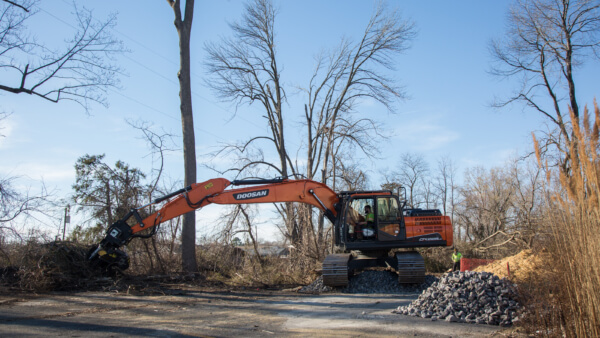
Property owners along the route of the Mariner East 2 construction would be wise to inspect their property following multiple construction spills. The following news story discusses the spills. The referenced list of 49 incidents is also included. View the list here. Construction spills could result in DEP fines. They could also result in Sunoco Pipeline liability for property harm beyond acquired property rights.
DEP issues few violations, one fine for Sunoco’s pipeline construction spills
Pennsylvania’s Department of Environmental Protection has issued four Notices of Violation, one consent order and one fine to Sunoco Pipeline for dozens of drilling mud spills that occurred along the length of the Mariner East 2 pipeline construction project. The DEP released a statement on Friday describing its efforts to manage Sunoco’s construction of the 350-mile long pipeline where drilling has caused water-contamination incidents in recent weeks.
DEP also provided a link to a list of 49 incidents, as well as copies of the Notices of Violations, one of which was issued on Thursday.
The agency fined Sunoco $87,600 and issued a consent decree on June 27 for 13 separate drilling mud spills that occurred between May and June in Cumberland County. The Notices of Violations report 552,000 gallons of bentonite mud spilled into LeTort Spring Run, an Exceptional Value wetland in Cumberland County. Exceptional Value waterways are those that are clean enough to support fish and wildlife, such as wild trout streams, or those that have high value recreational use.
In response to a Notice of Violation, Sunoco said on June 7 that it had “contained, captured and recirculated” the fluid back to the drill rig, and that it was not “discharged throughout the wetland.”
But the consent decree, dated about three weeks later on June 27 reports that Sunoco had not yet remediated the problem, and had shut down operations at DEP’s request on June 9. Up until Friday’s release, no public notification had been made of this incident.
Sunoco spokesman Jeff Shields said there was a release of 1,500-2,000 gallons into the LeTort wetland at the Cumberland County site but the company had recorded the 552,000 gallons because that was the volume of fluid that was recirculated through pumps during the cleanup.
Bentonite mud is non-toxic to humans, but can ruin aquifers, and in large quantities smother aquatic life. A recent spill in an Ohio wetland of several million gallons of drilling mud during pipeline construction resulted in the operation halted by federal authorities. Ohio’s environmental regulators tested the mud and found diesel fuel had been added. The company building the Rover pipeline through Ohio is Energy Transfer Partners, which recently merged with Sunoco.
Violations were also issued as a result of drilling mud spills in Brookhaven, Delaware County in May, and another in Middletown Township, Delaware County due to an incident that occurred earlier this week.
DEP’s statement follows a chorus of complaints from private well owners whose water has turned cloudy or dried up in some places along the line. The incidents have prompted calls for a halt to drilling, or even to all Mariner East 2 construction, from state lawmakers representing some affected parts of the route.
Gov. Tom Wolf responded to angry residents and their representatives on Thursday by ordering the DEP to do what was legally possible to fix the problem.
In Friday’s statement, DEP Secretary Patrick McDonnell said he wanted to assure the public that the DEP is taking their complaints seriously.
“With so much concern about the Mariner East 2 pipeline, the public needs to know that DEP is taking its oversight and regulatory enforcement role seriously,” McDonnell said. “This project has raised questions about public health and the health of the environment, and it is important to be transparent about the issues that have arisen over the course of the construction.”
McDonnell said there are “numerous” investigations underway into further possible violations, and that he expects to take more enforcement actions. He described the actions taken so far as “not the end of the road but the beginning.”
There were 61 spills of drilling fluid between April and June, according to documents turned over by DEP as part of a lawsuit challenging permits issued by the agency back in February. The discrepancy in the number of cases between the court filed documents and DEP’s recent release, is unclear.
DEP continues to face accusations that it issued permits for the pipeline even though deficiencies remained in Sunoco’s application, and that it has not required Sunoco to comply with permit conditions.
Critics said the DEP’s enforcement actions, and promises to do more, were not enough to ensure that drinking water and the natural environment are protected from the pipeline project.
“The fines levied by DEP are trivial,” said Eric Friedman, a member of the Middletown Coalition for Community Safety, an anti-pipeline group in Delaware County, where horizontal directional drilling this week resulted in a leak of bentonite, a non-toxic drilling mud, into a creek. “Their ability to deter continued unlawful behavior by Sunoco is insignificant.”
The group urged Gov. Wolf to halt construction, and for DEP to revoke the construction permits pending a public review that includes risks to public safety from the project.
State Rep. Leanne Krueger-Braneky, a Delaware County Democrat, said the DEP’s actions do not deflect her earlier call for a halt to all pipeline construction pending an investigation into the causes and solutions to the leaks.
“I still believe that the responsible thing to do would be to halt construction until their investigations are completed,” she said, referring to the DEP.
She described the enforcement actions as a “positive first step” but argued that they don’t solve the “systemic problem” that Sunoco continues to leak drilling fluid into creeks and impact aquifers.
“A handful of notices of violation don’t seem to be enough to hold Sunoco accountable,” she said.
Sunoco’s Shields noted that the company halted drilling in West Whiteland Township, Chester County on July 13 after some residents’ wells were affected. The company had restarted drilling several days after the accident, but has since shut down operations at the site.
“We are continually evaluating our drilling plans, and while construction continues throughout the rest of the state, we are working to ensure that the Governor’s concerns are addressed,” Shields said.
The 350-mile pipeline will carry natural gas liquids from the Marcellus Shale of southwestern Pennsylvania to an export terminal at Marcus Hook near Philadelphia. The $3 billion project is due for completion by the end of the third quarter.
Story written by: By Jon Hurdle and Susan Phillips | StateImpact Pennsylvania
Photo by: Emily Cohen / StateImpact PA
Photo Caption: Workers cleared trees to make way for the Mariner East 2 pipeline in Delaware County in March. The company has spilled at drilling mud in dozens of incidents.. DEP has issued four violations, and one fine.








